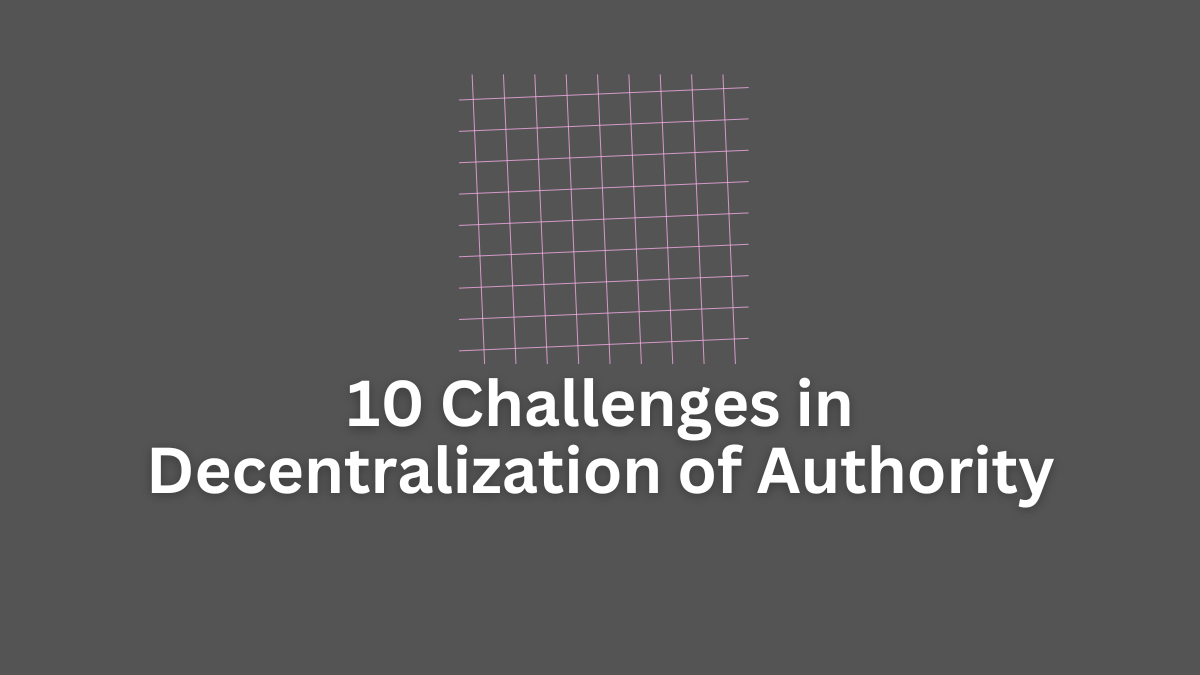Challenges in Decentralization
Decentralization is the distribution of decision-making authority and responsibilities from a central authority to various levels or units within an organization, government, or system, fostering autonomy and empowerment at lower levels.
Decentralization of authority, while offering various benefits, presents several challenges that organizations must address to ensure its successful implementation. Let’s explore the 10 common challenges in decentralization of authority and strategies to overcome them:
Selection of Inadequate Leaders
Challenge: Not all individuals possess the necessary leadership skills to handle decentralized responsibilities effectively.
Strategy: Implement robust leadership training programs to develop and nurture leadership qualities among potential candidates. Additionally, establish clear criteria for selecting leaders based on competencies and experience.
Lack of Autonomy
Challenge: Overbearing supervision from higher levels may hinder employee autonomy and empowerment at lower levels.
Strategy: Encourage a culture of trust and autonomy by providing clear guidelines and boundaries for decision-making. Empower lower-level employees with the authority to make decisions within their areas of responsibility while ensuring accountability.
Inadequate Task Explanation
Challenge: Insufficient clarity in task delegation may lead to misunderstandings and ineffective execution.
Strategy: Prioritize effective communication by clearly defining tasks, objectives, and expectations. Provide adequate training and support to ensure that employees understand their roles and responsibilities within the decentralized structure.
Lack of Specialized Knowledge
Challenge: Decisions made at lower levels may lack the specialized expertise needed for optimal outcomes.
Strategy: Foster collaboration and knowledge sharing between different levels of the organization. Encourage cross-functional teams and provide access to resources and expertise when needed. Invest in continuous learning and development programs to enhance employees’ skills and knowledge.
Resistance to Change
Challenge: Employees and managers may resist decentralization due to fear of loss of control or uncertainty about the new structure.
Strategy: Implement change management strategies to communicate the benefits of decentralization and address concerns proactively. Involve employees in the decision-making process and solicit their feedback to foster buy-in and ownership of the changes.
Read More: 10 Challenges in Job Design
Communication Breakdown
Challenge: Decentralization may lead to communication gaps and silos between different departments or levels of the organization.
Strategy: Establish effective communication channels and protocols to facilitate information sharing and collaboration. Encourage open dialogue and regular feedback sessions to address issues and align goals across the organization.
Lack of Standardization
Challenge: Decentralization may result in inconsistent processes and practices across different departments or units.
Strategy: Develop standardized procedures and guidelines to ensure consistency and alignment with organizational objectives. Implement regular audits and quality control measures to monitor compliance and identify areas for improvement.
Read More: 10 Challenges in Organizing
Resistance from Centralized Units
Challenge: Centralized units or individuals may resist decentralization due to concerns about loss of authority or control.
Strategy: Engage with centralized units early in the decentralization process to address concerns and solicit input. Highlight the benefits of decentralization, such as improved agility and responsiveness, to gain support and cooperation.
Complexity of Coordination
Challenge: Coordinating activities and initiatives across decentralized units may become complex and challenging.
Read More: 10 Challenges in Group Decision Making
Strategy: Establish clear roles, responsibilities, and communication channels to facilitate coordination and collaboration. Implement regular meetings or check-ins to align priorities and address any issues or bottlenecks promptly.
Inadequate Resource Allocation
Challenge: Decentralization may lead to disparities in resource allocation and utilization across different units or departments.
Strategy: Implement robust resource management processes to ensure equitable distribution and efficient utilization of resources. Monitor resource allocation and performance metrics regularly to identify areas of improvement and reallocate resources as needed.
In conclusion, these are the 10 challenges in decentralization of authority and strategies to overcome those challenges.
Read Next: 10 Challenges in Departmentalization
